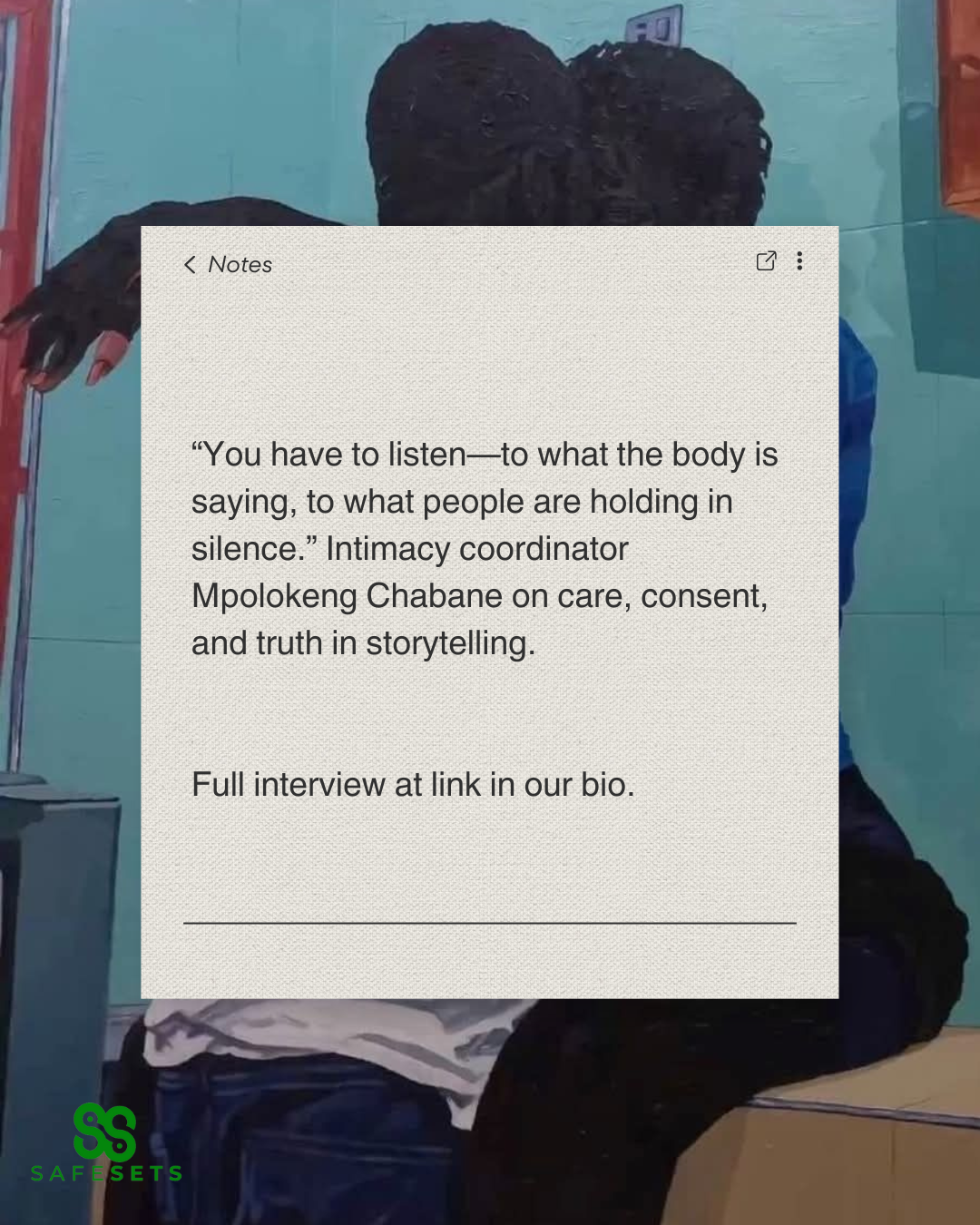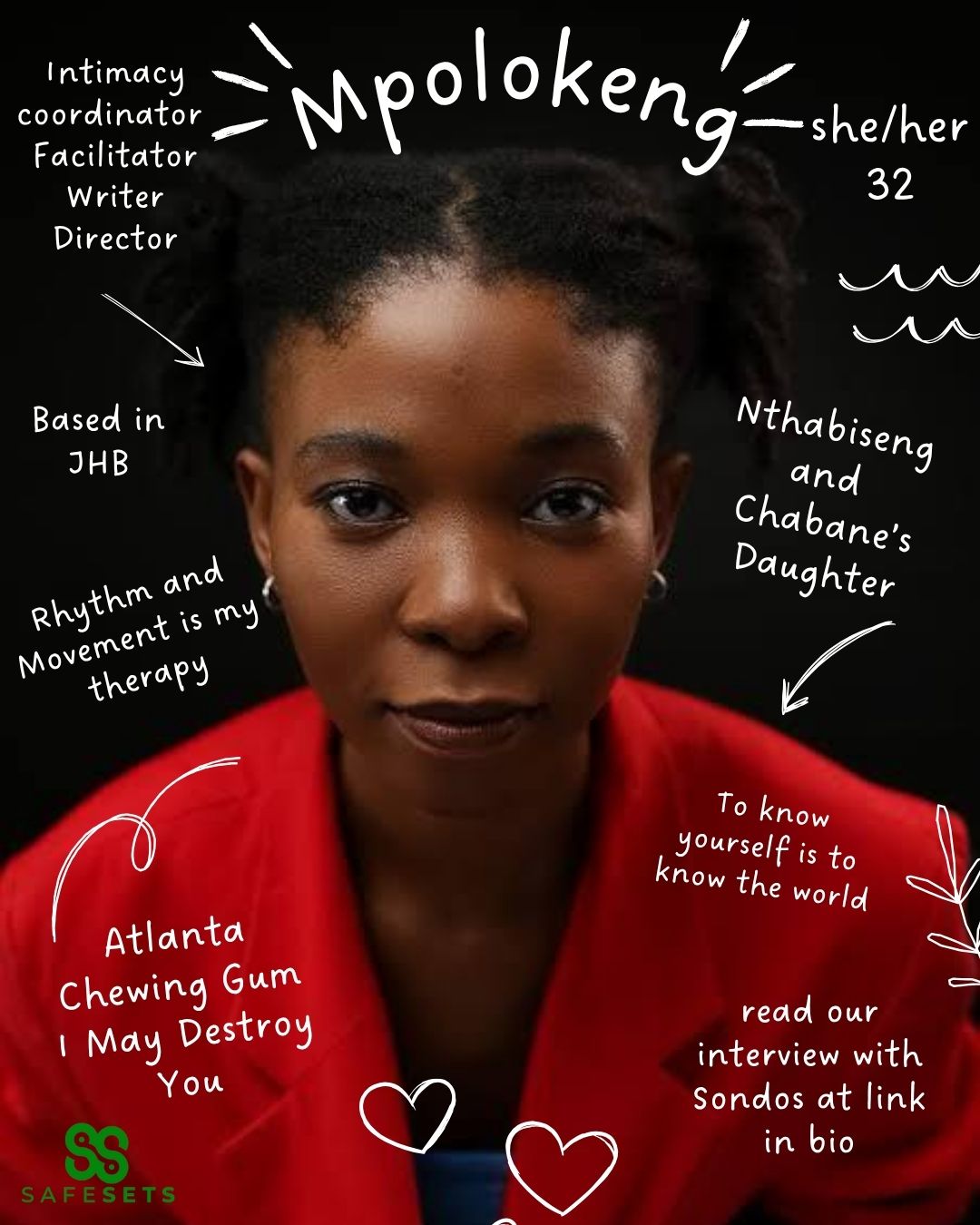Holding Space, Building Trust: Mpolokeng Chabane on Intimacy, Consent, and Collaboration
In Johannesburg's fast-paced film industry, intimacy work is still carving out its place. For Mpolokeng, the role of intimacy coordinator emerged naturally from a background in theatre and a longstanding commitment to storytelling, care, and truth-telling. She speaks to Loren Loubser with a mix of candour and generosity, weaving stories from early theatre rehearsals into the demands of today's sets.
For Mpolokeng Chabane, intimacy coordination is about more than just safety or logistics—it is about holding space, protecting truth, and ensuring that actors can work without fear of harm. "You have to listen," she explains, "to what the body is saying, to what people are holding in silence."
Here, Mpolokeng reflects on her journey into the work, her style on set, and the ways motherhood is reshaping how she sees intimacy and care.
Loren: How did you first find your way into intimacy coordination?
Mpolokeng: I came into it through my work in theatre. I'd already been thinking a lot about consent and storytelling—how you tell difficult truths, how you hold space when there's vulnerability. Moving into intimacy coordination felt like a continuation of that work, but in a new medium.
Loren: How would you describe your style?
Mpolokeng: Collaborative, open, and very much about listening. I'm not there to dictate. I'm there to create a space where actors can feel safe to explore and where directors know their vision is being supported. It's about balance—between care and creativity.
Loren: Do you remember a moment that really shaped how you think about this work?
Mpolokeng: Yes. In theatre, I once worked on a piece where an actor disclosed something very personal in the rehearsal room. There was a pause, a silence, and I realised that the whole room needed care in that moment—not just the person who had spoken. That moment has stayed with me. It showed me that intimacy work isn't just about scenes of sex or nudity. It's about recognising when vulnerability is present, and honouring it.
Loren: What challenges do you notice in the South African industry?
Mpolokeng: Speed, for one. Productions here move so fast, sometimes there isn't time built in for intimacy work. And then there's conservatism—you can feel it in people's hesitation, in the way some actors or crew have been taught what's "appropriate." It means I have to be especially attentive, to make sure people don't feel forced into something that goes against their values.
Loren: How do you respond when people think intimacy coordination limits creativity?
Mpolokeng: I don't see it that way at all. For me, boundaries actually create freedom. If an actor knows what is and isn't okay, they can throw themselves into the performance without second-guessing. And for directors, it's not about us taking over—it's about helping realise their vision in a way that everyone can commit to.

Loren: Can you share an example of a scene you're proud of?
Mpolokeng: There was a scene that could have been very exposing, very vulnerable. The director had a strong vision, but the actor was nervous. We worked slowly, layering in steps, making sure the actor had agency at every point. In the end, the scene was powerful—not because of what was shown, but because of what was felt. That taught me that intimacy isn't about spectacle, it's about truth.
Loren: What legacy do you hope to leave in this field?
Mpolokeng: I hope people will see intimacy coordination as essential, not optional. I want to leave behind an industry where actors know they'll be safe, where directors trust the process, and where consent is embedded in how we work.
Loren: Has becoming a mother changed how you think about intimacy and care?
Mpolokeng: Absolutely. It's deepened my understanding of what it means to hold space. Motherhood teaches you patience, and it sharpens your awareness of vulnerability—your own and others'. It's made me even more committed to building environments where people feel protected and respected.
Loren: If you had to sum up your approach in three words?
Mpolokeng: Listening, care, truth.
Interviewed in September 2025 by Loren Loubser

